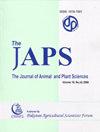Usage of biopesticides in agriculture practices
IF 0.5
4区 生物学
Q3 AGRICULTURE, MULTIDISCIPLINARY
引用次数: 1
Abstract
Using pesticides is the first method to control diseases and kill pests and weeds, which are the most menacing and the biggest problem facing agriculture. It is commonly used by developing since it is the solution to increase yields and solve agriculture problems. A part from big farmers, the majority of peasant farmers are unable to pay for synthetic pesticides because of their high price. Moreover, the small fields cultivated by subsistence farmers making the use of such pesticides uneconomic. In morocco, peasant farmers use even pesticides, which are over dose or they use non-certified products. It is understood that it is very harmful for human health and environment as well. Therefore, pesticide plants do not eliminate all pests, but keep their populations under the threshold of harm, and have more advantages than synthetic pesticides. Moreover, pesticide plant extracts decompose rapidly in the environment; which limits the risk of environmental pollution and improves the sanitary quality of cultivated products; also, it controls insect pests by protecting their natural enemies rather than by spraying crops with synthetic pesticides. The aim of this study is to record all products used by farmers to control Bruchus rufimanus especially the use of bio pesticides around Meknes city (Mejjat and Sebet jahjouhe area). It was established that most of big peasant farmers use synthetic pesticides. While small farmers have only access to traditional methods such as Capsicum frutescent, Urtica dioica, salt and ash wood, if not using non-certified products among which rodenticides.生物农药在农业实践中的使用
病虫害和杂草是农业面临的最具威胁性和最大的问题,使用农药是控制病虫害和杂草的首要方法。由于它是提高产量和解决农业问题的解决方案,因此被发展中国家普遍使用。一部分来自大农场主,由于合成农药价格高昂,大多数农民无力支付。此外,自给自足的农民耕种的小块田地使得使用这种杀虫剂不经济。在摩洛哥,农民甚至使用过量的农药,或者使用未经认证的产品。据了解,它对人体健康和环境也非常有害。因此,农药植物并不能消灭所有害虫,而是使其种群数量保持在危害阈值以下,比合成农药更具优势。此外,农药植物提取物在环境中分解迅速;限制了环境污染的风险,提高了栽培产品的卫生质量;此外,它通过保护害虫的天敌来控制害虫,而不是用合成杀虫剂喷洒作物。本研究的目的是记录梅克内斯市(Mejjat和Sebet jahjouhe地区)农民使用的所有产品,特别是生物农药的使用情况。事实证明,大多数大农户使用合成农药。而小农只能使用传统的方法,如辣椒、荨麻、盐和灰木,如果不使用未经认证的产品,其中的灭鼠剂。
本文章由计算机程序翻译,如有差异,请以英文原文为准。
求助全文
约1分钟内获得全文
求助全文
来源期刊

Journal of Animal and Plant Sciences
Multiple-
CiteScore
1.50
自引率
0.00%
发文量
128
审稿时长
6 months
期刊介绍:
The Journal of Animal and Plant Sciences (JAPS) is a bi-monthly publication and is being published regularly since 1991 by the Pakistan Agricultural Scientists Forum (PAS FORUM). It publishes original research papers, review, extension/clinical articles on all aspects of animal (including fisheries/wildlife) and plant sciences, agricultural economics, rural sociology and other related subjects. The journal is read, abstracted and indexed by the abstracting/indexing agencies of international repute.
 求助内容:
求助内容: 应助结果提醒方式:
应助结果提醒方式:


